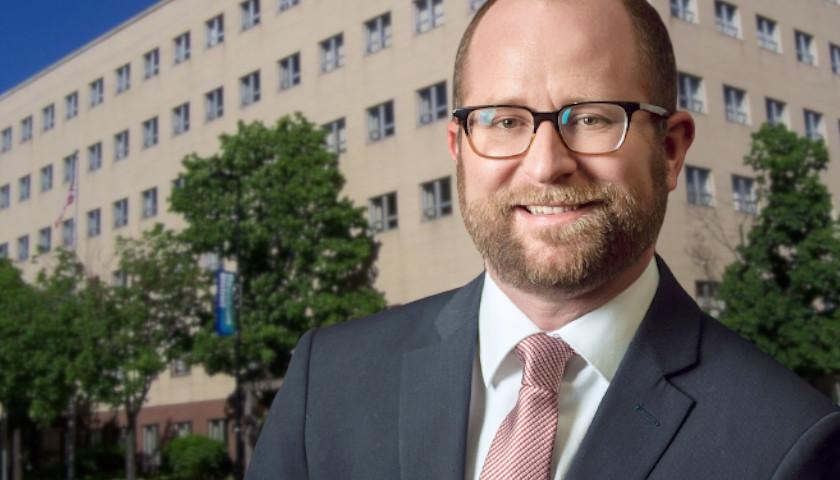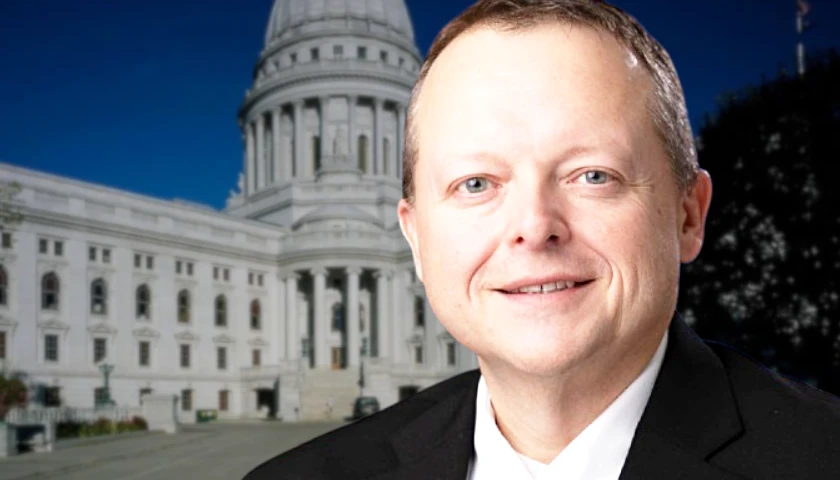Records obtained by The Star News Network show Green Bay city officials installed at least three audio recording devices in City Hall — without notifying the City Council or the public.
Alderman Chris Wery, who represents Green Bay’s 8th District, described the secret recordings as the kind of “Big Brother stuff” found in a George Orwell novel.
“This is an astonishing affront to people’s privacy rights,” Wery told The Wisconsin Daily Star in an interview Tuesday.
The Green Bay City Council is scheduled to meet tonight, and Wery said he has a lot of questions for Mayor Eric Genrich and other city officials.
Wery filed an open records request and learned that the recording devices were installed last year — two on the second floor outside the council chamber and the mayor’s office, and one on the first floor outside the clerk’s office.
He said he has learned the audio is being run through the Green Bay Police Department and is being monitored there, despite the fact that the department’s policy is that such recording devices in public places can’t be used for surveillance. The Star reached out to the police department but had not received comment as of publication.
The records show the placement of the audio equipment, but they don’t explain why they were installed without the advance notification of the City Council or Green Bay citizens.
Wery and other sources who have battled with the liberal mayor and his city clerk have their suspicions.
Genrich, a highly partisan Democrat, was a central figure in the Zuckerbucks controversy in which Wisconsin’s five largest cities took in millions of dollars in so-called “safe election” grants from liberal groups funded by Facebook founder Mark Zuckerberg. An investigation by Wisconsin Spotlight showed the 2020 grant funding from the Chicago-based Center for Tech and Civic Life (CTCL) came with long-time Democratic Party operatives and liberal activists intricately involved in the administration of the 2020 presidential election in Milwaukee, Madison, Kenosha, Racine, and Green Bay.
In Green Bay, an operative was found to have the keys to the room holding the boxes of absentee ballots and had offered to work with elections officials to “cure” or correct absentee ballots with missing information. Green Bay’s city clerk at the time resigned, citing election integrity concerns about the activists and mayor’s office.
CTCL handed out hundreds of millions of dollars in Zuckerberg funded grants, with the brunt of the money going to Democrat-led cities in battleground 2020 states.
Green Bay’s City Clerk Celestine Jeffreys, who was Genrich’s top aide at the time of the 2020 election scandal, has had what many describe as a confrontational relationship with Republican Party election observers. She has been accused of locking out observers from monitoring ballot counts.
Wery said he will be calling for for an investigation into the audio recording devices.
“I want to know who paid for this. Was this part of the Zuckerbucks money, also?” the council member said.
The mayor’s office could not be immediately reached for comment. A staff member told The Star Genrich was in meetings all day.
It appears the city could face some legal liability, all the more if, as some suggest, city officials are using the recording devices to “bug” their political enemies. Sources note the potential thorny questions of attorney-client privilege, should the recording devices be capturing conversations at City Hall between individuals and their legal representatives appearing on official city business.
“It could be privileged conversations before or after a meeting, while the council is in closed session,” Wery said. “They’re out in the hallways discussing their strategy. This goes against federal wire tapping laws.”
Wisconsin is what is commonly known as a one-party consent state, meaning a person who is a party to a wire, electronic or oral communication, or who has obtained prior consent from one party, can legally record and divulge the contents of the communication, unless he does so for the purpose of committing a criminal act.
In the case of the Green Bay recording devices, it doesn’t appear that any of the individuals involved in an audio-captured conversation are aware they are being recorded.
According to a Wisconsin Legislative Council memo prepared for Green Bay-area state Senator Andre Jacque (R-De Pere) in September, parties that have a “reasonable expectation of privacy” in an oral communication have privacy protections under the Wisconsin Electronic Surveillance Control Law.
“If the parties to the conversation have a reasonable expectation of privacy and no party has consented to the recording, then recording the conversation is unlawful,” the memo states.
It could be argued that because the recording devices were installed in a public place, there is limited presumption of privacy. But, Wery and others argue, Green Bay’s failure to post signs or information notifying the public of the recording devices muddies the legal argument.
Last year, the American Civil Liberties Union of Rhode Island raised concerns that a system recording audio and video in the East Rhode Island City Clerk’s office illegally captured conversations between visitors in the room. In that case, the city posted signs alerting the public.
“It caught our attention, because if true, it raises extremely significant and serious privacy issues,” ACLU Executive Director Steven Brown said in an interview with the Providence Journal.
Mayor Bob DaSilva cited quality control as the reason the city decided to start recording conversations.
“It’s just way to protect our employees from allegations and protect the public from any issues that may arise,” he told WPRI.
Wisconsin government has been down this road before. In 2020, Gov. Tony Evers’ staff was found to have recorded a conversation he had with Republican legislative leaders without the lawmakers’ knowledge.
Evers claimed he had no knowledge of the secret audio recording, and that a “staffer wanted help in taking notes and that’s why the staffer did that.” But the secret recordings came to light only after Evers’ office told the Milwaukee Journal Sentinel of statements made by Assembly Speaker Robin Vos (R-Rochester) and then-Senate Majority Leader Scott Fitzgerald (R-Juneau) during the private conversation.
In Green Bay, Wery said he spoke to the city’s integrated technology director, who has recently retired. The IT director, according to Wery, said he questioned the installation and use of the audio recording devices, but was told by the city’s legal department that it was okay.
Wery said he wants the resignations of anyone who approved of the equipment.
“This is truly Big Brother stuff that would make George Orwell blush,” the council member said.
– – –
M.D. Kittle is the National Political Editor for The Star News Network.
Background Photo “Green Bay City Hall” by Royalbroil. CC BY-SA 2.5.





